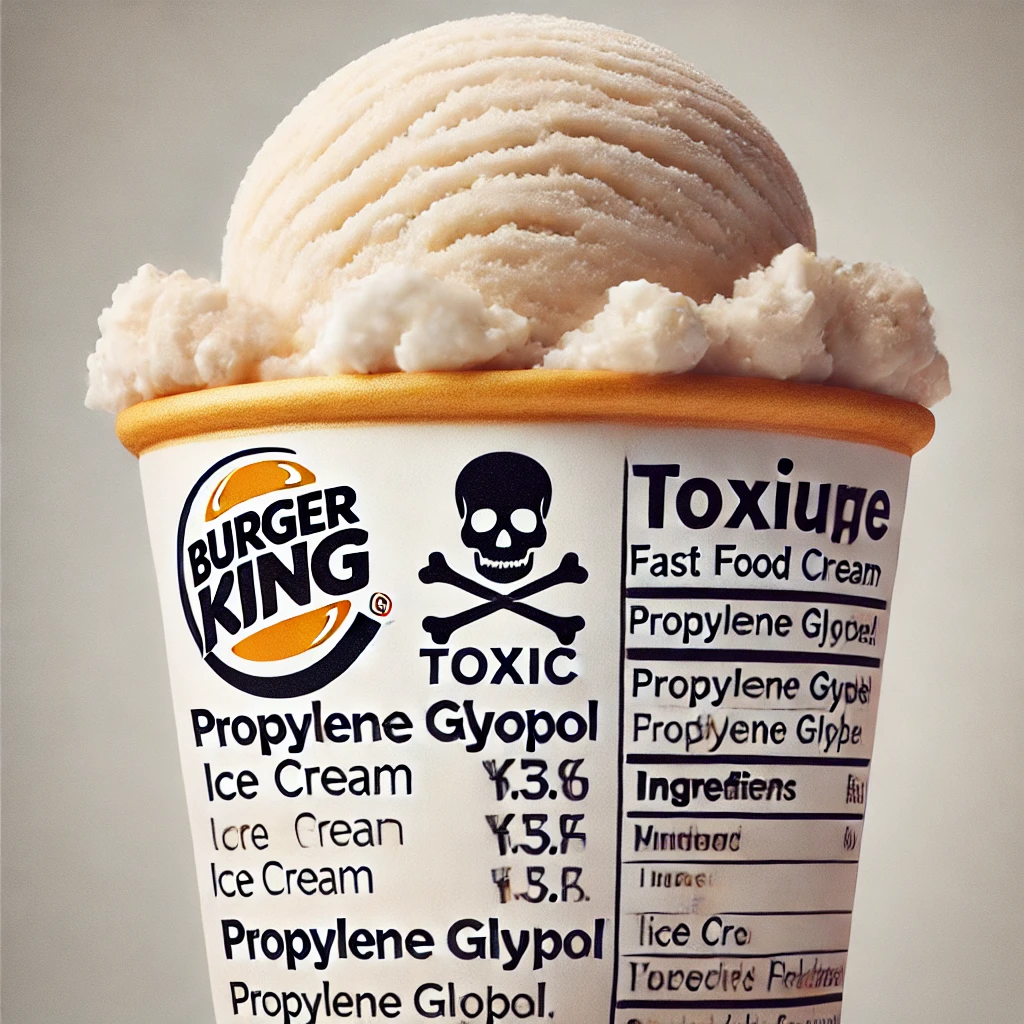
In a world where convenience often trumps quality, fast food chains like McDonald’s and Burger King have become household names, offering quick and easy meals to millions of people every day. But what are you really getting when you indulge in that seemingly harmless ice cream cone or shake? The answer might shock you—and it’s a wake-up call we all need to hear.
What’s Lurking in Your Fast Food Ice Cream?
Let’s get straight to the point: the ice cream you’re eating from places like Burger King and McDonald’s is not just milk, sugar, and vanilla. Far from it. One of the most alarming ingredients that has been uncovered in these treats is propylene glycol—a chemical commonly found in antifreeze, de-icing solutions, and industrial applications. Yes, you read that right: the same substance used to keep your car from freezing is being used in your dessert.
Propylene glycol is added to improve texture, maintain moisture, and extend the shelf life of processed foods. But here’s the kicker—this is not food. It’s a synthetic compound that your body doesn’t know how to process properly. Over time, the consumption of such chemicals can lead to serious health issues, as your body struggles to break down and eliminate these toxic substances.
Fast Food’s Dirty Secret: It’s Not Food, It’s Chemicals
When you think about food, what comes to mind? Fresh, wholesome ingredients that nourish your body? Or a concoction of chemicals designed to mimic the taste and texture of real food? Unfortunately, the latter is often what you’re getting when you opt for fast food.
Chains like McDonald’s and Burger King have mastered the art of using artificial flavors, colors, and preservatives to create products that are more about chemistry than culinary art. These aren’t just minor tweaks to enhance flavor; these are full-blown chemical engineering projects designed to make you crave more of their products, regardless of the cost to your health.
Here’s a glimpse into the kind of ingredients you might find in fast food ice cream:
- Propylene Glycol: Used to retain moisture and texture, this chemical is also a key ingredient in antifreeze. It has been linked to various health issues, including allergic reactions, neurological symptoms, and potential toxicity with long-term exposure.
- Artificial Flavors: Instead of using real vanilla or other natural flavors, these chains often rely on synthetic chemicals to create the taste you expect. These artificial flavors can disrupt your body’s natural signals, leading to overeating and other health problems.
- Preservatives: To keep their products fresh for as long as possible, fast food chains load their items with preservatives—chemicals that can interfere with your body’s natural processes and contribute to a range of chronic health conditions.
- Stabilizers and Emulsifiers: These chemicals keep ingredients from separating and maintain a smooth texture, but they’re far from natural. They can cause digestive issues and may contribute to inflammation and other health problems over time.
The Fast Option is Often the Bad Option
It’s time to face the facts: the convenience of fast food comes with a hidden cost. When you choose the fast option, you’re often choosing the bad option—a meal loaded with chemicals that have no place in a healthy diet. These aren’t just empty calories; they’re potentially harmful substances that could be setting you up for long-term health issues.
The big fast food chains have made billions by cutting corners on quality and using cheap, synthetic ingredients to create products that are highly profitable but nutritionally bankrupt. It’s a strategy that prioritizes their bottom line over your health, and it’s time to push back.
Wake Up and Vote with Your Wallet
The power is in your hands. Every time you spend money on fast food, you’re voting for more of the same—more processed, chemically-laden products that do nothing but harm your body. But by choosing to spend your money on real, wholesome food, you send a clear message to the food industry: enough is enough.
Opt for natural, organic ingredients. Choose foods that are made with care, not chemicals. And most importantly, take the time to read labels and understand what’s really in the food you’re eating. The fast option might seem convenient, but it’s often the bad option. Invest in your health by choosing foods that nourish, not foods that poison.
The Real Cost of Fast Food
When you choose fast food, you’re not just spending money—you’re potentially sacrificing your health. The long-term effects of consuming these chemically engineered products can be severe, from chronic diseases to compromised immune function. Is the convenience really worth the risk?
Let’s return to a time when food was about nourishing our bodies with real ingredients, not filling them with synthetic chemicals. Your health is worth the investment, and by choosing better options, you can drive change in the food industry. When we stop buying into the fast food fantasy, we force these companies to reconsider their practices. It’s time to demand better, for ourselves and for future generations.
Remember, the fast option is often the bad option—but with a little effort, you can make choices that support your well-being and contribute to a healthier world.
Discover more from
Subscribe to get the latest posts sent to your email.
